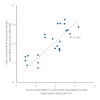Agile, on-demand wastewater surveillance of virus infections to support pandemic and outbreak response in Rotterdam-Rijnmond, the Netherlands, 2020 to 2022
- PMID: 39574391
- PMCID: PMC11583307
- DOI: 10.2807/1560-7917.ES.2024.29.47.2400055
Agile, on-demand wastewater surveillance of virus infections to support pandemic and outbreak response in Rotterdam-Rijnmond, the Netherlands, 2020 to 2022
Abstract
BackgroundWastewater surveillance may support early and comprehensive detection of infectious diseases' community transmission, particularly in settings where other health surveillance systems provide biased or limited information. Amid the SARS-CoV-2 pandemic, deploying passive samplers to monitor targeted populations gained importance. Evaluation of the added public health value of this approach in the field can support its broader adoption.AimWe aimed to assess the feasibility and utility of on-demand wastewater surveillance, employing passive samplers, for SARS-CoV-2 and monkeypox virus (MPXV) in small/targeted populations, also considering ethical aspects.MethodsPilot case studies in the Rotterdam-Rijnmond region were used for a systematic assessment of the feasibility and utility of wastewater monitoring of SARS-CoV-2 (variants) and MPXV using passive sampling. Each case study was instigated by actual questions from the Public Health Service about disease transmission.ResultsCase study results demonstrated the feasibility and utility of on-demand wastewater surveillance with successful identification of a local peak in SARS-CoV-2 transmission, early detection of wider Omicron variant transmission after the first case was reported, as well as indication of no emerging local MPXV transmission. Ethical considerations led to the abandonment of one case study involving a displaced population.ConclusionsThe study confirms the feasibility and utility of passive sampling for real-time infectious disease surveillance, at desired spatiotemporal resolution. Ethical concerns and operational challenges were identified, highlighting the need for early stakeholder engagement and ethical guideline adherence. The method could be used to study under-surveyed populations and be extended beyond SARS-CoV-2 and MPXV to other pathogens.
Keywords: Cities; Disease outbreaks; Mpox virus; SARS-CoV-2; Students; Wastewater; passive samplers.
Conflict of interest statement
Figures


Similar articles
-
Averting an Outbreak of SARS-CoV-2 in a University Residence Hall through Wastewater Surveillance.Microbiol Spectr. 2021 Oct 31;9(2):e0079221. doi: 10.1128/Spectrum.00792-21. Epub 2021 Oct 6. Microbiol Spectr. 2021. PMID: 34612693 Free PMC article.
-
Detection of mpox virus in wastewater provides forewarning of clinical cases in Canadian cities.Sci Total Environ. 2024 Jul 10;933:173108. doi: 10.1016/j.scitotenv.2024.173108. Epub 2024 May 9. Sci Total Environ. 2024. PMID: 38729376
-
Passive Sampling of SARS-CoV-2 for Wastewater Surveillance.Environ Sci Technol. 2021 Aug 3;55(15):10432-10441. doi: 10.1021/acs.est.1c01530. Epub 2021 Jul 15. Environ Sci Technol. 2021. PMID: 34264643
-
Monkeypox outbreak: Wastewater and environmental surveillance perspective.Sci Total Environ. 2023 Jan 15;856(Pt 2):159166. doi: 10.1016/j.scitotenv.2022.159166. Epub 2022 Oct 3. Sci Total Environ. 2023. PMID: 36202364 Free PMC article. Review.
-
Immunobiology of MPox Infection and Its Management: Experience From Developing Nations.Rev Med Virol. 2025 Jan;35(1):e70015. doi: 10.1002/rmv.70015. Rev Med Virol. 2025. PMID: 39832826 Review.
References
MeSH terms
Substances
Supplementary concepts
LinkOut - more resources
Full Text Sources
Miscellaneous
